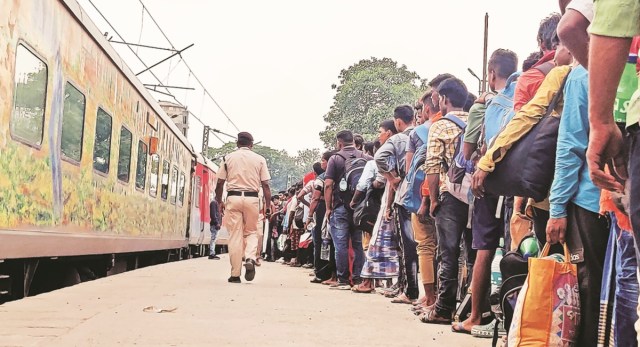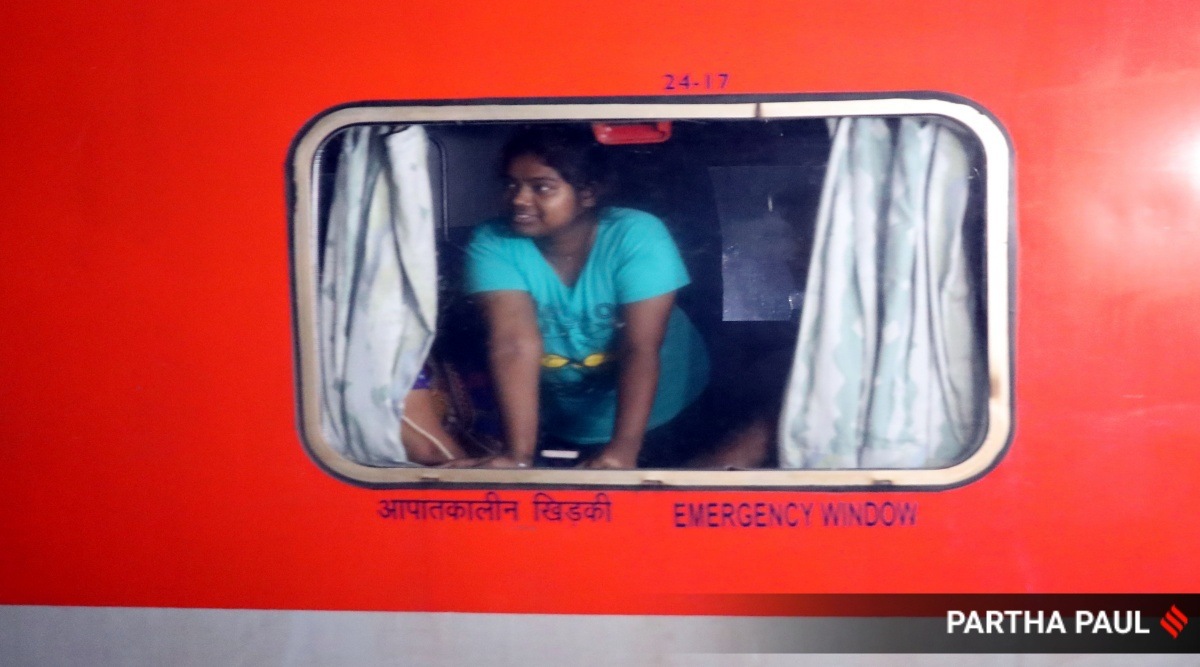But Wednesday was the first time he prayed before he got on board.

Five days after the Coromandel Express was involved in an accident that killed 288 in Odisha’s Bahanaga, the train left on its usual route from Shalimar in West Bengal to the Tamil Nadu capital, carrying around 1,500 jittery travellers.
Story continues below this ad
Muruddin said he was supposed to be on board the ill-fated train on Friday. “Seventeen of my relatives and I were supposed to take the Coromandel, but our plan got delayed. I saw the news later — it still gives me goosebumps,” he told The Indian Express, while trying to settle his family in the same general compartment bogey 2 that met with an accident.
Like many others on the train, travelling is not optional for Muruddin — his job at a brick kiln in Chennai is the only way to make ends meet. “The train is our life; we can’t avoid it even if we wanted to,” he said. Muruddin added that he takes several people from his village to the brick kiln, and his employer pays for his travel.
1/4

After the rail tragedy on June 2, which killed 275 people, first Coromandel Express from Shalimar to Chennai passes through the rail tragedy site and Bahanaga Bazar railway station.
2/4

The train left on its usual route from Shalimar in West Bengal to the Tamil Nadu capital, carrying around 1,500 jittery travellers.
3/4

On Wednesday, the 23-bogey train had 1,477 confirmed passengers, plus the excess crowd in the general compartment.
4/4

The train that connects four states — West Bengal, Odisha, Andhra Pradesh and Tamil Nadu — is the preferred way to commute for migrant labourers as well as people seeking medical treatment in South India.
On Wednesday, the 23-bogey train had 1,477 confirmed passengers, plus the excess crowd in the general compartment.
Story continues below this ad
Also on the train, in compartment S5, was Bullet Shaw (33) from Bihar’s Siwan district. The daily wager could be heard chanting the Hanuman Chalisa as the train began its journey.
 Shalimar Station, bags kept in queue by migrant labours before the arrival of the Coromandel train. (Express photo by Sweety Kumari)
Shalimar Station, bags kept in queue by migrant labours before the arrival of the Coromandel train. (Express photo by Sweety Kumari)
“I take the train from Shalimar since it’s a direct line to Chennai. Life is uncertain — people die of heart attack while sitting in AC rooms. We certainly don’t have the luxury not to take risks,” he said.
The train that connects four states — West Bengal, Odisha, Andhra Pradesh and Tamil Nadu — is the preferred way to commute for migrant labourers as well as people seeking medical treatment in South India. It used to stop at four stations, but that figure has gradually climbed to 17.
“Coromandel is known for its punctuality and is jam-packed through the year. Such is the demand that it runs daily from Shalimar to Chennai,” said the station master at Shalimar station.
Story continues below this ad
Inside the B1 air-conditioned compartment, Puja Kumari, a government school teacher from Bihar’s Katihar, was on edge. “My heart skips a beat every time there’s a jerk. I just want to reach Chennai safely,” said Kumari, who is travelling to collect her MA degree.
Ganga Mondal, a retired TTE (travelling ticket examiner) who was among the passengers, recalled how he was posted on the Coromandel often during his duty days. “It is commendable how the train is back on track in just five days,” said Mondal, who was travelling to Chennai to drop his daughter there.
Balancing her three-year-old in her lap, Jaharana Bibi (26) from South 24 Parganas explained why so many like her take the train every day: “There is no work in Bengal; sometimes you don’t even get paid for the work you do. In Chennai, they pay us 700-800 per day in a brick kiln. Our life isn’t that valuable; if we stay scared, we won’t be able to eat.”
At 9.30 pm, the train crossed the same stretch in Bahanaga where Friday’s accident took place. Curious to have a look outside, passengers pushed each other to get to the windows, many with their phone cameras out. Instead of its usual 130 kmph, the train crossed the stretch at a much slower speed on Wednesday night.
Story continues below this ad
At the next station in Bhadrak, Balasore municipality head clerk Gajadhar Misra prepared to deboard. He said he has been taking the same train between Balasore and Bhadrak since 2011, but on Friday, he left office early and boarded the Janshatabdi instead. As he gathered his belongings, he hummed, “Zindagi ek safar hai suhana, yahan kal kya ho kisne jana.”







 Shalimar Station, bags kept in queue by migrant labours before the arrival of the Coromandel train. (Express photo by Sweety Kumari)
Shalimar Station, bags kept in queue by migrant labours before the arrival of the Coromandel train. (Express photo by Sweety Kumari)





